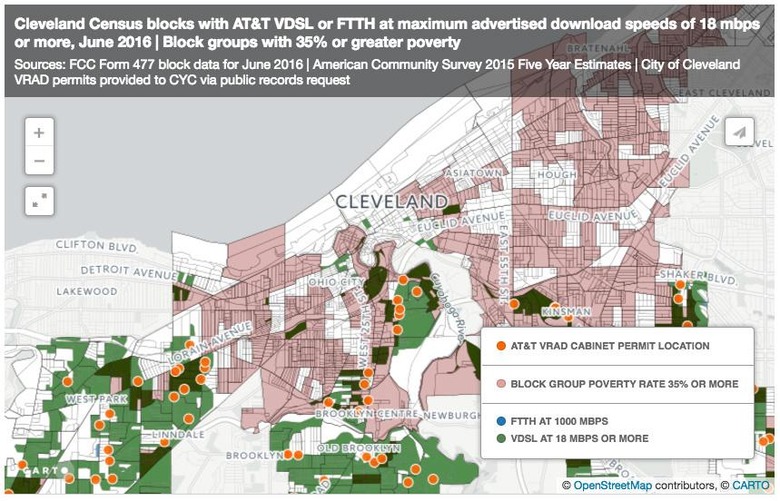AT&T DSL Redlining Hits Low-Income Cleveland Regions Says FCC Complaint
Cleveland, like many large cities in the US, is home to neighborhoods that span the financial spectrum, ranging from wealthy to low-income and impoverished. A new complaint filed with the FCC accuses AT&T of ignoring many low-income neighborhoods within Cleveland, instead focusing on upgrading its VDSL infrastructure in wealthier regions in the city. The complaint was recently filed on behalf of three Cleveland residents.
The three Cleveland residents claim that their experiences with AT&T as their Internet service provider match the findings detailed in a report titled 'AT&T Digital Redlining.' The report, which is from the National Digital Inclusion Alliance, suggests that AT&T is intentionally skipping over certain places based on 'ethnic and racial characteristics' of the communities.
According to the residents on whose behalf the complaint was filed, they pay AT&T for high-speed Internet access but instead experience Internet speeds as low as 1.5Mbps. The alleged lack of high-speed Internet access has a detrimental effect on their lives, making it impossible to use a home security system dependent on high-speed broadband, making it more difficult for their kids' to complete online homework assignments, and more.
The complaint formally accuses AT&T of:
1. "Unjust and unreasonable discrimination in the provision of broadband internet access service"
2. "Misrepresentation of its intent to serve all residents in Cleveland, Ohio"

While AT&T's fiber-enhanced VDSL infrastructure is available in the majority of suburbs within the county where Cleveland is located, the aforementioned study indicates that AT&T has neglected to introduce this technology in 'the overwhelming majority' of places where the individual poverty rate is greater than 35-percent.
Unfortunately, this practice of excluding the poorest parts of a city from improved infrastructure isn't limited to Cleveland, at least per the report. The same 'redlining' tactic has been observed in cities throughout the U.S., indicating a practice that ultimately harms those who live within the cities.
Lack of adequate Internet access can prevent kids from completing homework, leading to poor grades and loss of opportunities; it is also increasingly necessary for applying to jobs, paying bills, accessing free information, and more.
You can view maps of AT&T's Internet service speeds throughout Cleveland here.
